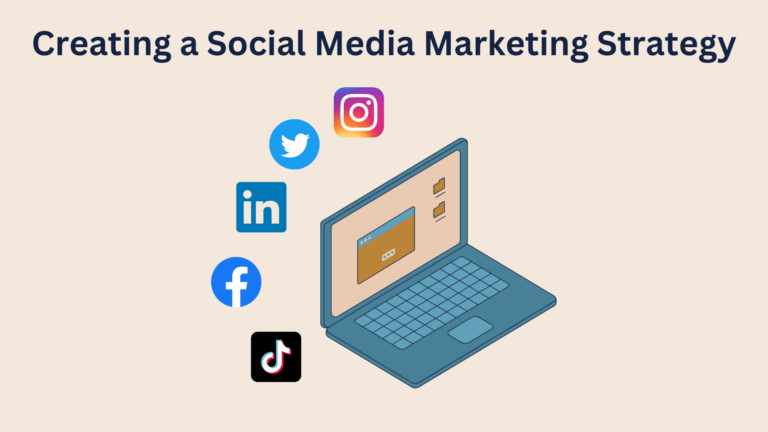Social Media Marketing Tips
by Jordan Barish

Illustration by Natalie Peña-Galvis
How your business can make the most of social media
Social media is a useful tool that can drive connection and increase brand awareness. With different platforms serving different purposes, it can be difficult to know how to use them to their full potential. Conducting a social media audit to analyze what strategies are not working for your business can reveal what steps need to be taken to create an authentic and successful social media presence. Establishing goals across platforms, creating a content calendar and keeping up with metrics are all necessary parts of a strong social media marketing strategy.
Keep reading to find out what steps your business can take to ensure that it is meeting its marketing objectives online.
Conducting the necessary research
If your business is already on social media but you are not satisfied with the impressions or engagement, conducting a social media audit can be helpful. A social media audit is a review of your business’s social media metrics to recognize areas for growth.
Social media audits make note of the engagement, demographic and publishing information across all of your business’s profiles. They reveal weaknesses in your business’s current social media marketing strategy – or reveal the need to have a strategy in the first place. Social media audit templates can be found on websites like Hootsuite or Sprout Social.
If your business has not yet taken advantage of social media as a tool for marketing, choosing which platform(s) to get started on can be overwhelming. The platforms your business should make use of depend on customer demographics, location and what type of product or service you offer. Here is a quick rundown of the pros for each platform:
Facebook: Facebook is good for targeting local customers and its ad platform can help with reaching new customers.
Instagram: Instagram is great if your business has products or services that are visually appealing.
Twitter: Twitter is more conversational, making it a useful platform for answering customer questions in real-time
TikTok: If your target audience is younger, TikTok is a great place to post engaging and creative content; it also offers the opportunity for virality without needing a large, established following.
LinkedIn: Depending on your business, LinkedIn offers a platform to share industry tips and network with other professionals.
After creating your profiles or completing your social media audit, it’s time to set goals across your business’s platforms and take the necessary steps to achieve them.
Planning out your social media strategy
Different goals require your business to take different actions on social media. If your business wants to increase brand awareness, focus on creating content that is authentic to your brand’s values and personality. To generate more sales, content may need to be more informative about promotions or exclusive deals. If you want to grow your business’s audience, improving Search Engine Optimization (SEO) with keywords and hashtags is a good place to start. In short, there is not a one-size-fits-all for how to run your business’s social media.
Regardless of your business’s goals, a consistent and cohesive schedule across platforms is essential. Creating a social media content calendar can help your business to make the most of its social platforms and meet metric goals.
Your social media content calendar should include the type of content, the date it should be posted, a link to the content (the image, video, article, etc.), the body copy and any tags, hashtags or links needed.
There are many different content calendar templates online, so choose whatever format (weekly, monthly, platform-specific, etc.) works best for your business and your needs. Your business can also make use of scheduling tools to ensure that content is being posted when it needs to.
It is important that the content you are planning out fits the platform(s) it will be posted to. A short-form video can work on TikTok or Instagram Reels, but it might not be suited to Twitter, for example. Your content also needs to be engaging. For tips on increasing social media engagement with the content you create, check out this past blog from the Brand Studio.
Evaluate and Revise
Your business’s social media marketing plan does not end just because posts are going up; your strategy may need constant revision to verify that your business is maximizing its performance across platforms.
Some common metrics to measure and manage include:
Reach: how many unique users see a post
Clicks: amount of clicks on a post or account
Likes
Engagement: interactions (likes, comments) divided by impressions
Once you have an idea of how your business is performing across its platforms, the appropriate changes can be made to the social media marketing strategy.
When used correctly, social media can help your business learn more about its customers, increase visibility and establish a brand voice. An up-to-date marketing plan can help your business make the most of an online presence.

